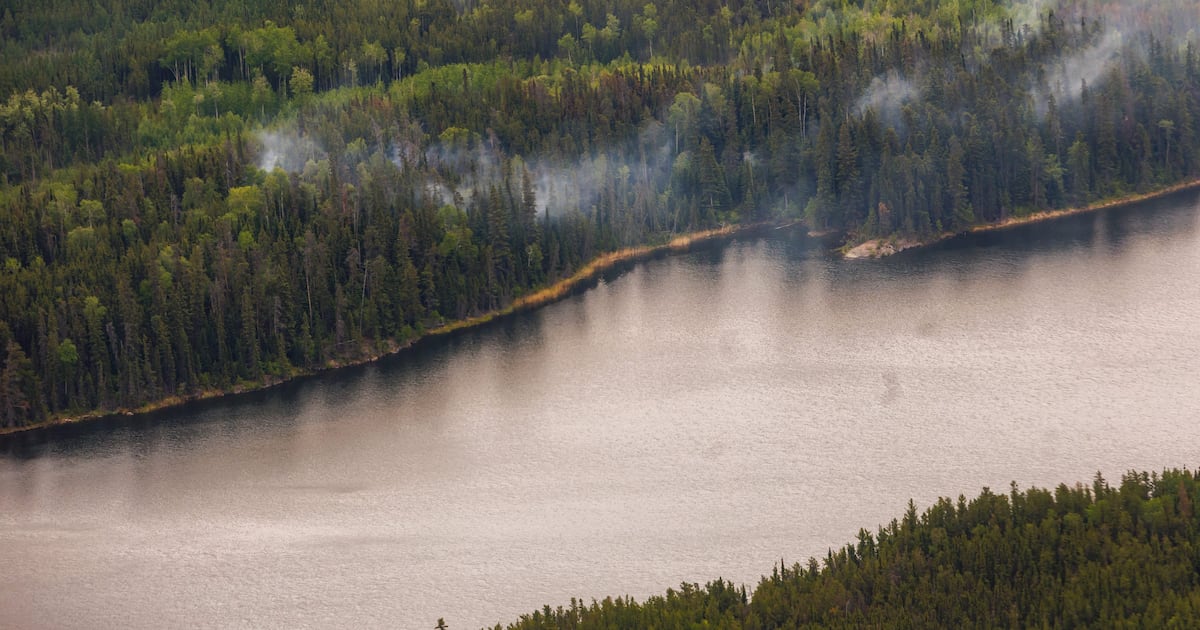Top Stories
Wildfires Trigger Air Quality Alerts Across Four Provinces

As wildfires in Manitoba continue to spread, air quality alerts have been issued across four Canadian provinces. The smoke from these fires has raised concerns about health risks, prompting calls for heightened public awareness. Jeffrey Brook, an air quality expert, emphasized the importance of being informed about smoke levels and their potential impacts in an interview with CTV News Channel.
Current Air Quality Situation
According to Environment Canada, there are currently 281 active air quality warnings in effect nationwide. The most severe conditions are reported in Manitoba and Saskatchewan, with the smoke also affecting large areas of northern Ontario and parts of Quebec. Brook noted that the particulate matter from the smoke poses significant health hazards, especially for vulnerable populations.
“It’s extremely high levels of particulate matter, tiny particles that penetrate deep into people’s lungs,” Brook stated. He added that individuals exposed to smoke may experience symptoms ranging from eye, nose, and throat irritation to more severe issues like wheezing and chest pains. In light of these health risks, Environment Canada advises limiting outdoor activities and considering rescheduling any planned events outside.
Impact of Wildfires in Manitoba
Currently, there are 107 active wildfires in Manitoba alone, prompting emergency evacuations in certain areas. This summer has seen a total of 270 wildfires across the province, a notable increase that has led to the declaration of a second state of emergency by Wab Kinew, the Premier of Manitoba. The state of emergency will remain in effect until August 9, 2023, and may be extended based on ongoing assessments.
Kinew highlighted the unprecedented scale of this fire season, stating, “Manitoba is seeing over 10 times the number of hectares burning compared to the average fire season.” As wildfires continue to ravage the region, Brook suggests that Canadians must adapt to the changing climate, which is leading to drier and warmer conditions.
“This is kind of the new normal,” Brook remarked, reflecting on the reality many are facing as they navigate the challenges posed by climate change. With the situation evolving, it is crucial for residents in affected areas to stay informed and take precautions to protect their health.
As the wildfires persist, the broader impact on air quality will require ongoing attention and awareness from both individuals and public health officials.
-

 Politics4 weeks ago
Politics4 weeks agoSecwepemc First Nation Seeks Aboriginal Title Over Kamloops Area
-

 World5 months ago
World5 months agoScientists Unearth Ancient Antarctic Ice to Unlock Climate Secrets
-

 Entertainment5 months ago
Entertainment5 months agoTrump and McCormick to Announce $70 Billion Energy Investments
-

 Science5 months ago
Science5 months agoFour Astronauts Return to Earth After International Space Station Mission
-

 Lifestyle5 months ago
Lifestyle5 months agoTransLink Launches Food Truck Program to Boost Revenue in Vancouver
-

 Technology3 months ago
Technology3 months agoApple Notes Enhances Functionality with Markdown Support in macOS 26
-

 Lifestyle3 months ago
Lifestyle3 months agoManitoba’s Burger Champion Shines Again Amid Dining Innovations
-

 Top Stories2 months ago
Top Stories2 months agoUrgent Update: Fatal Crash on Highway 99 Claims Life of Pitt Meadows Man
-

 Politics4 months ago
Politics4 months agoUkrainian Tennis Star Elina Svitolina Faces Death Threats Online
-

 Sports5 months ago
Sports5 months agoSearch Underway for Missing Hunter Amid Hokkaido Bear Emergency
-

 Politics5 months ago
Politics5 months agoCarney Engages First Nations Leaders at Development Law Summit
-

 Technology5 months ago
Technology5 months agoFrosthaven Launches Early Access on July 31, 2025



















